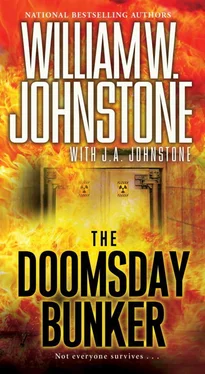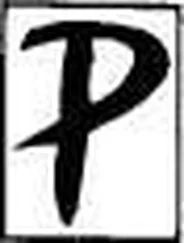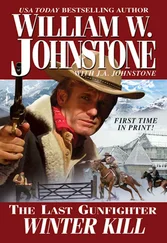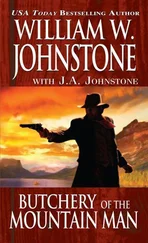“Most of those vehicles look burned,” one of the engineers said. “The heat from the explosion probably ignited the gas in their tanks. We’re not going to find anything useful here.”
Larkin nodded. He had suspected that would be the case while hoping it wouldn’t be. They wouldn’t be able to grab what they needed and get back down into the project in a matter of hours. They were going to have to range farther afield.
“We’ll head west along the county road,” he said. “How far do you think we’ll need to go in order to find usable parts and gasoline?”
The man just shook his head helplessly. He didn’t know the answer to that question any more than the rest of them did.
“Let’s go,” Larkin said. He started winding his way through the wrecked cars along the county road. From time to time he glanced inside one of the vehicles, knowing what he was going to see: the charred remains of the unfortunate people who had been caught out here, trying futilely to get away. Sometimes there was an almost complete skeleton slumped over a melted steering wheel. More often there was just a jumble of blasted-apart bones.
Larkin had seen plenty of bad things in wartime… but never anything like this.
He didn’t let himself think about that. As always, he concentrated on the job at hand.
Something moved up ahead. Just a flicker, but that was enough to make Larkin bring up the AR-15 and tighten his finger on the trigger. He didn’t have a target, though. Whatever it was had ducked back out of sight.
The other men had noticed his reaction and responded accordingly, lifting their weapons as well. One of the men asked, “Did you see something, Patrick?”
“Yeah, but it seems to be gone now. And before you ask, I didn’t get a good look at it. Couldn’t tell what it was, except that it wasn’t very big.”
Another man, a fellow in his twenties named Wade, said, “At least we haven’t seen any aliens or mutants or zombies yet.”
“No, and you won’t, because they don’t exist.”
Wade said, “There’s usually a guy in the books and movies who says something like that, and he’s the first one who gets eaten.”
“Not today,” Larkin said. “Come on.”
They moved ahead. He didn’t see anything else suspicious. The line of wrecked and burned-out cars stretched as far as he could see along the road, which was never more than a few hundred yards at a time because of the terrain. He knew this area very well, but it was difficult to tell exactly where they were because everything looked so different. All the houses along here had been destroyed in the blast. Here and there he saw what he thought were the remnants of foundations.
He thought they had gone close to a mile from the project’s entrance when he called a halt and told the two men with the instruments to take more readings. After a minute or so, one of the men said, “The levels are holding steady. If anything, they’re down slightly.”
“Does that mean we can take these suits off ?” one of the men asked.
“Not yet,” Larkin said. “It’s not hurting anything to wear them.”
There was some grumbling about that, but nobody objected too much. Undoubtedly, in each man’s brain lurked some fear of the environment up here on the surface. It was human nature to accept what their technology told them… but also to be a little leery of believing in it too much.
The sky brightened a little more. The sun was climbing higher, even though Larkin couldn’t see it. A long ridge rose to their right. Larkin knew that up ahead was a road that climbed to the top of that ridge, and from that vantage point they could see for miles. He wanted to get up there and take a look around.
Where that other road turned off, there had been a small convenience store and gas station. Maybe the tanks there still held some of the precious stuff.
As they trudged on, some of the vehicles they passed began to look as if they were in somewhat better shape. They didn’t appear to have been burned as badly. Larkin thought that was an indication their gas tanks hadn’t exploded from the sharp spike in temperature, even though the heat had peeled most of the paint from the outside of the vehicles. The group had brought along mechanical siphons and some plastic gas cans. Larkin called a halt and pointed to a car with the windows all blown out but not much fire damage.
“Check the tank in that one, Wade,” he said.
The young man got out the siphoning equipment and unscrewed the car’s gas cap. He slid the tube down into the tank and worked the pump. Larkin saw gas climbing through the tube. Wade grinned and stuck the other end of the tube into one of the gas cans. The flow improved.
“We got it, Cap,” Wade said. “You want me to go ahead and fill up this can?”
“Yeah. Get as much as possible out of there. We have a dozen cans. As soon as we fill them, we’ll head back. No point in going any farther.”
Larkin glanced at the top of the ridge again. He wanted to get up there, but if it wasn’t necessary to accomplish the mission, they wouldn’t risk it. Not today, anyway.
The gas in the car’s tank filled two and a half cans before it sputtered out. Larkin and his men moved on, searching for another vehicle that looked promising. As they left, though, he glanced into the car, saw the half-intact skeleton in the front seat, and wished he could say thanks to whoever that person had been.
Then he saw the car seat strapped into the backseat and had to tighten his jaw as he turned away and kept moving. He felt his heart slugging harder in his chest. The grief and anger over what had happened to the world would overwhelm him if he allowed it to. He forced himself to concentrate on the goal instead.
They passed a creek that flowed between rocky banks on both sides of the road and passed underneath it through a culvert. Up ahead, maybe a mile away, was the convenience store and the road that led up to the ridge.
Larkin was thinking about that when gunshots suddenly exploded behind him.
He twisted around in time to see several men charging out of the creek bed, where they had been hidden by those rocky banks. They carried rifles, and as more shots erupted, Larkin saw that a couple of his men were down. He cursed himself for leading them into an ambush. The sheer barrenness of the landscape must have convinced him, at least subconsciously, that no one was around to threaten them.
That reaction lasted only a fraction of a second, however. Then the AR-15 was at his shoulder, spitting fire as fast as he could pull the trigger.
The group from the Hercules Project was better armed and outnumbered the attackers. They opened fire along with Larkin, and the ambushers, clad only in rags, went down with blood welling from numerous wounds in their gaunt bodies.
Larkin knew these men, shot up as they were, would no longer be a threat, but there could be more of them. He kept his rifle ready as he swiveled back and forth to check the creek on both sides of the road. No more attackers emerged, but that didn’t mean he could stop worrying. Armed survivors could still be hidden out there.
Meanwhile, he had men down. He shouted through the helmet, “A couple of you check those wounded men while the rest of you stay alert!”
They formed a circle around the men on the ground and the two who knelt to see how badly they were hurt. After a minute or so, one of those men reported, “Blakely is dead, Patrick. Herring doesn’t seem to be hurt too bad, though.”
“You’re sure about Blakely?” Larkin asked, his voice curt with anger.
“I’m certain. He was shot right through the heart. Looks like Herring just got a graze on his side, though. Hard to be sure in this damned suit.”
Читать дальше









